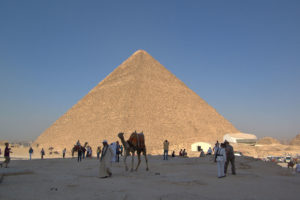by John Holbrook Jr.
A Biblical View, Blog #017 posted November 7, 2016, edited March 9, 2021.
Most versions of ancient chronology put the Egyptian Pharaoh Cheops in the 26th century BC and the Hebrew patriarch Abraham in the 20th or 19th century BC – a difference of six or seven centuries. In my chronology of the ancient world, which takes the Bible as its point of departure, Cheops and Abraham were contemporaries.
According to my chronology, Abraham lived 175 years (1965-1794 BC). In 1894 BC, at the age of 75, Abraham received a communication from God. [1] God gave him (1) a Command to leave his home in Ur-of-the-Chaldees and travel to a land to which God would lead him and (2) a Promise that his descendents would constitute a great nation. When Abraham informed his father Terah of the vision which he had received from God, Terah believed his son and decided to move the entire family from Ur of the Chaldees to Haran, which his older son had apparently founded, and presumably from there into Canaan. When he reached Haran, however, Terah died, leaving the family in the hands of Abraham.
After burying and mourning for his father, Abraham departed from Haran with his household, crossed the Euphrates River, and entered into Canaan. He traveled through Sichem to the Plain of Moreh, where he camped for an unspecified time. There God visited Abraham and issued his first promise of the land of Canaan to Abram and his descendants. Abraham built an altar on the Plain of Morel to commemorate God’s visit. He then traveled to a mountain between Hai on the east and Bethel on the west, where he camped and built another altar.
Circa 1893 BC, the land of Canaan suffered from an extensive famine, and so Abraham led his family south out of Canaan and into Egypt.[2] Because his sister and wife Sarah was a beautiful woman and Abraham was afraid that some Egyptian would kill him in order to take her, he instructed Sarah to identify herself as his sister. As soon as they arrived in Egypt, the Egyptians, as Abraham had anticipated, took an interest in Sarah and brought her to the attention of Pharaoh. When Pharaoh saw Sarah, he desired her and asked Abraham to relinquish her, which Abraham did. After taking Sarah into his harem, the pharaoh treated Abraham well, giving him servants, cattle, and probably other gifts.
Because Pharaoh had taken Sarah into his harem, the Lord visited great plagues upon him and his house. Interestingly, Pharaoh must have learned of the Lord’s displeasure directly from the Lord, because he approached Abraham with the question, “What is this that thou hast done unto me? Why didst thou not tell me that that she was thy wife? Why saidst thou, she is my sister? So that I might have taken her to me to wife: now therefore behold thy wife, take her, and go thy way.” The implication of “I might have taken her to me to wife” is that he discovered the truth about Sarah before he took her into his bed. Thus Abraham’s sojourn in Egypt probably did not last very long. Nonetheless, Abraham and Pharaoh were undoubtedly intelligent, educated and formidable men and undoubtedly spent much time talking while Abraham was Pharaoh’s guest.
Now according to my chronology of the ancient world before 1464 BC, , which relies heavily on the work of Donovan Courville, the ruler of Egypt in 1893 BC was Osirophus, the first pharaoh of the 4th Dynasty. He ruled Egypt for 23 years (1901-1878 BC). He was also known as Cheops, Khufu, and Sufi I. Abraham’s visit would have fallen in his year 9.

Great Pyramid of Cheops at Giza – weepingredorger.wordpress.com
Osirophus is credited with building the largest of the pyramids at Giza, which has earned it the title “the Great Pyramid.” It is one of the wonders of the ancient world, and it has engendered much speculation concerning its purpose, the manner of its construction, and whether or not the form and dimensions of its structure carry information concerning the past and future of mankind. Would not the pyramid have been a prime topic of conversation between Osirophus and Abraham? Would not Osirophus have taken Abraham on a tour of the construction site? My answer to both questions is, “Yes, without a doubt!”
Does the Great Pyramid provide any evidence of being influenced by Abraham. In response to the question, I would point to some curious aspects of the structure. First, its capstone is missing, and second, the sarcophagus in the king’s chamber is empty. Archaeologists assume (a) that the capstone has been the victim of either erosion or theft, along with much of the pyramid’s exterior sheathing, and (b) that the sarcophagus was emptied by thieves. Both are possible and reasonable explanations. On the other hand, the capstone may have been omitted and the sarcophagus may have been empty since its installation for reasons that did not occur to the archaeologists. The phrase ‘the stone which the builders rejected has become the head of the corner’ appears five times in the Scriptures (Matthew 21:42, Mark 12:10, Luke 20:17, Acts 4:11, and 1 Peter 2:7) and there are many references in Scriptures to the sepulcher in which Jesus was laid as being empty on the Sunday morning following the Friday on which he was laid to rest. Is it possible that, while he was a guest of Osirophus, Abraham shared with the pharaoh some details of the vision of the future which God had entrusted to him?
© 2016 John Holbrook Jr.
________________________________________________________________________________
[1] See Genesis 12:1-3.
[2] See Genesis 12:10- 20 for the record of Abraham’s visit to Egypt.
